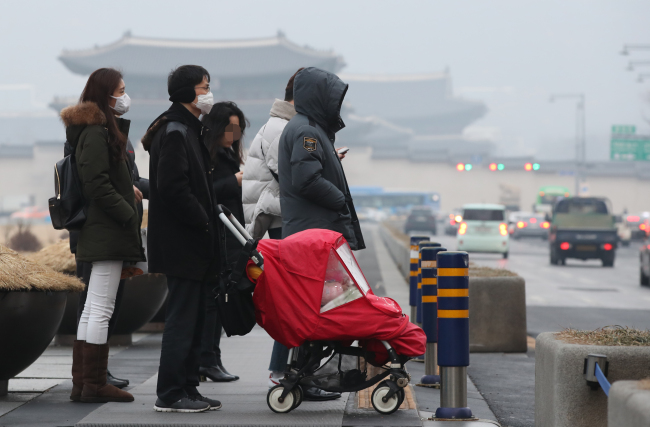‘Fine dust not natural disaster, free transit cost maintenance illegal’
By Lim Jeong-yeoPublished : Jan. 17, 2018 - 15:38
The Seoul Metropolitan Government’s decision to pull money from the Disaster Relief Fund for costs incurred by the free public transit system is a violation of higher law, Rep. Lim Lee-ja of the main opposition Liberty Korea Party said Wednesday.
The city of Seoul on Monday and Wednesday provided free public transportation during heavy commuting hours due to critical fine dust density. The free rides comes in a bid to reduce vehicle emissions.
While on Monday the program showed little effect, as still many people drove, Wednesday saw about 3.2 percent more people using public buses and 4.4 percent more using the subway, compared to the same time last week.
The city of Seoul on Monday and Wednesday provided free public transportation during heavy commuting hours due to critical fine dust density. The free rides comes in a bid to reduce vehicle emissions.
While on Monday the program showed little effect, as still many people drove, Wednesday saw about 3.2 percent more people using public buses and 4.4 percent more using the subway, compared to the same time last week.

The estimated expense to provide free rides for a day during commuting hours reportedly comes to 6 billion won ($5.65 million). The city is planning to make up for the loss from the Disaster Relief Fund.
Rep. Lim, belonging in the National Assembly’s Emergency Committee for Measures Against Fine Dust, said that the micro dust is not included in the Act on the Management of Disasters and Safety, and that the city is in violation of the higher law by attempting to access the fund.
The Ministry of Environment had previously taken the position that the fine dust occurs mostly due to vehicle emissions, fossil fuel usage and construction, which are manmade sources of pollution and therefore not suitable to be categorized under natural disasters.
Rep. Lim accused the city of Seoul of populist measures to win people over for the upcoming regional election slated for June.
Regarding Lim’s comments, Seoul Mayor Park Won-soon said at a New Year’s press conference at Seoul City Hall on Wednesday that the people of Seoul are already taking in fine dust in a grave crisis and that Lim’s point of view would only stir public ire.
Park stressed the need for the wider public to reassess their perceptions of fine dust and pre-emptively alter their behavior for better air quality. Park also expressed regret that satellite cities surrounding Seoul had limitations in following suit, due to the number of aged diesel vehicles.
The city of Seoul plans to continue the free transit system on days with a fine dust alert, when micro dust, or particulate matter 2.5, density is over 50 micrograms per cubic meter from midnight to 4 p.m. and forecast to remain so the next day.
By Lim Jeong-yeo (kaylalim@heraldcorp.com)


![[Exclusive] Korean military set to ban iPhones over 'security' concerns](http://res.heraldm.com/phpwas/restmb_idxmake.php?idx=644&simg=/content/image/2024/04/23/20240423050599_0.jpg&u=20240423183955)




![[Herald Interview] 'Amid aging population, Korea to invite more young professionals from overseas'](http://res.heraldm.com/phpwas/restmb_idxmake.php?idx=644&simg=/content/image/2024/04/24/20240424050844_0.jpg&u=20240424200058)

![[Pressure points] Leggings in public: Fashion statement or social faux pas?](http://res.heraldm.com/phpwas/restmb_idxmake.php?idx=644&simg=/content/image/2024/04/23/20240423050669_0.jpg&u=)








